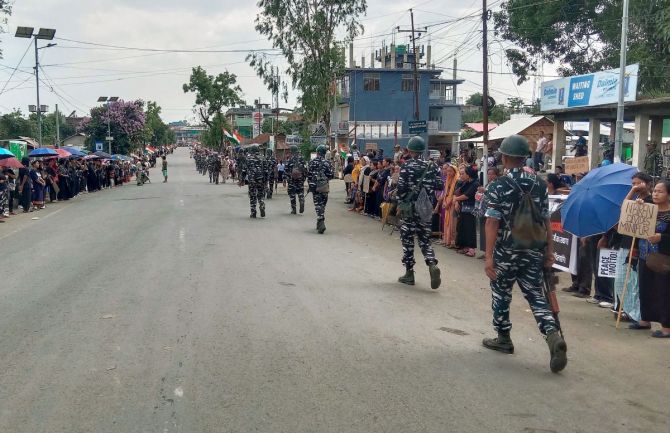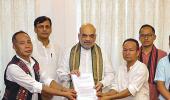'If Manipur is divided on ethnic lines, similar demands will come in other states also.'

The violence which started on May 3 in Manipur continues almost a month later.
It took 26 days for India's home minister to visit the troubled north east state.
Professor W Nabakumar, former head of the department of anthropology, Manipur University, met Home Minister Amit A Shah on his three-day visit to Manipur.
"A state cannot be divided on ethnic lines. If such things happen, it will not be the end of the problem, but it will be the beginning of a problem for the entire India," Professor Nabakumar tells Rediff.com's Shobha Warrier in the concluding part of a must-read interview.
- Part 1 of the Interview: 'Many Manipuris have lost faith in the central forces'
Would you say this is the beginning of all the problems the state faces now?
Yes. The imbalance in the population became a concern for the Meiteis, but it did not result in any kind of conflict between the Meiteis and the Kukis in the beginning.
With the exponential growth in the Kuki population, they needed more land for their livelihood. That's when the problem started.
First, the Kukis tried to widen their cultural geography by claiming the traditional scared places of Meiteis as their own.
It was done to expand their area of heritage by attacking the collective psyche of the Meiteis.
Many Meiteis started feeling that the Kukis are trying to consolidate their position in Manipur.
All this happened during this decade.
You mean, the Meiteis fear that the Kukis will start dominating them culturally?
Yes. But it is because of the illegal migrants from Myanmar and not by the Indian citizens.
People of Manipur know that the old Kukis and the new Kukis who had entered Manipur hundreds of years ago are citizens of the state.
But they have been instigated by the illegal migrants now.
So, the conflict is not between the Meiteis and the Kukis; the conflict is between the Meiteis and the people who have entered Manipur illegally from Myanmar and identify themselves as Kukis.

It is claimed that the state government is responsible for the violence. Is it true?
No. The truth is this.
With the exponential growth of the Kuki population, they started inhabiting many of the reserve and protected forests of Manipur.
They are also indulging in huge deforestation for poppy plantation.
So, they are not just destroying the forests, but also destroying young people through poppy plantation.
The state government had to declare a war against drugs as many young people had become drug abusers in the state.
And the government decided to take stringent action against poppy plantations by destroying all the poppy fields.
So, those are engaged in poppy plantation are totally against the present state government.
Because they are invading the reserve forests, availability of water has become a huge problem in the entire state.
So, the state government started evicting people from the reserve forests.
Do you think the Manipur high court order to look into the issue of granting Scheduled Tribe status to the Meiteis was a reason for the violence we are witnessing now?
I told you earlier that the illegal migration resulted in an imbalance in the population in the state.
Because of the imbalance in the population, around 50% of the Meitei population wanted the name Meitei to be included in the Scheduled list of the Indian Constitution.
They felt, otherwise, their existence would be affected.

Why is it that the Kukis feel threatened? Do they feel that the Meiteis will take over the hilly areas?
Yes, that's their fear. According to the land law of the state, the Meiteis cannot inhabit the hill areas because the hill areas are protected for the tribals.
The Meiteis can settle in the valley, but not in the hills. The valley area of the state is only 8% of the total area; 92% of the area is hilly.
In the 8% of the area, the Meiteis and many other communities inhabit. So, there is pressure on the land.
If the Meiteis are included in the Scheduled list, they can inhabit the hilly area too. That's why the Kukis and the Nagas do not want it.
They feel their position will be threatened if the Meiteis come to live in the hills.
That's their apprehension. To some extent, it is understandable.
The Scheduled Tribe demand committee sent a number of memoranda to the Government of India to recognise Meiteis as a Scheduled Tribe.
The Government of India instructed the government of Manipur to send the relevant papers like the socio-economic survey and ethnography of the Meiteis.
These two documents are very necessary to come to a decision, and the decision will be taken by the Government of India.
So, you have to understand that including a community in the Scheduled list is taken by the Government of India, and not by the high court or the Supreme Court.
The Government of India has only asked for the relevant papers. They have not yet taken any decision whether to include the Meiteis as a Scheduled Tribe.
You have to also understand that in a democratic country, every community has a right to demand something. But it will be considered only at the proper forum.
And the government has asked for the relevant papers, not for recognition but only for consideration.
But the government of Manipur has not yet sent any papers to the Government of India.
They have remained silent so far. That's why some member went to the Manipur high court and requested the court to instruct the state government to send the relevant papers of the Government of India.
Then the Manipur high court instructed the state government to send the papers to the central government within four months.
The high court never instructed the state government to recognise Meiteis as a Scheduled Tribe. The order was only an instruction to send the relevant papers to the central government for consideration.
The fact is, common people have no knowledge of all these things. They were fed only the wrong information that the high court had instructed the state government to recognise Meiteis as a Scheduled Tribe.
The Kukis -- especially the illegal migrants -- felt threatened, and asked all the tribal people to stay together against this.
They organised a massive tribal rally against the Meiteis becoming a Scheduled Tribe.
The illegal immigrants exploited the situation and instilled fear in the minds of the common people who do not have the right information or know the correct picture.

Some describe the violence as ethnic cleansing...
No..no..no.. Ethnic cleansing is a wrongly used terminology and I am very much against it.
There was resentment in the minds of the illegal migrants because of the war against drugs and also protecting the reserve forests as these policies have affected the Kukis greatly.
The spark was the wrong information of the inclusion of Meiteis in the Scheduled list.
The spark ended in the form of violence against the Meiteis.
In this, the role of the armed Kuki organisations who entered Manipur illegally is very much there.
During the conflict, they even burnt down all the forest offices in Kuki inhabited districts.
 IMAGE: Professor W Nabakumar
IMAGE: Professor W NabakumarSome Kukis are asking for a separate Hill Council. Will that solve the problem?
That will never solve the problem because Manipur is a very small state.
I pointed out to the home minister in our 4-minute meeting with him, that integration of Manipur is very much necessary for the integration of India because Manipur is a polyethnic society. It is a mini India.
If the unity of Manipur is affected, it will affect the unity of India.
If Manipur is divided on ethnic lines, similar demands will come in other states also.
A state cannot be divided on ethnic lines. If such things happen, it will not be the end of the problem but it will be the beginning of a problem for the entire India.
Feature Presentation: Aslam Hunani/Rediff.com












 © 2025
© 2025